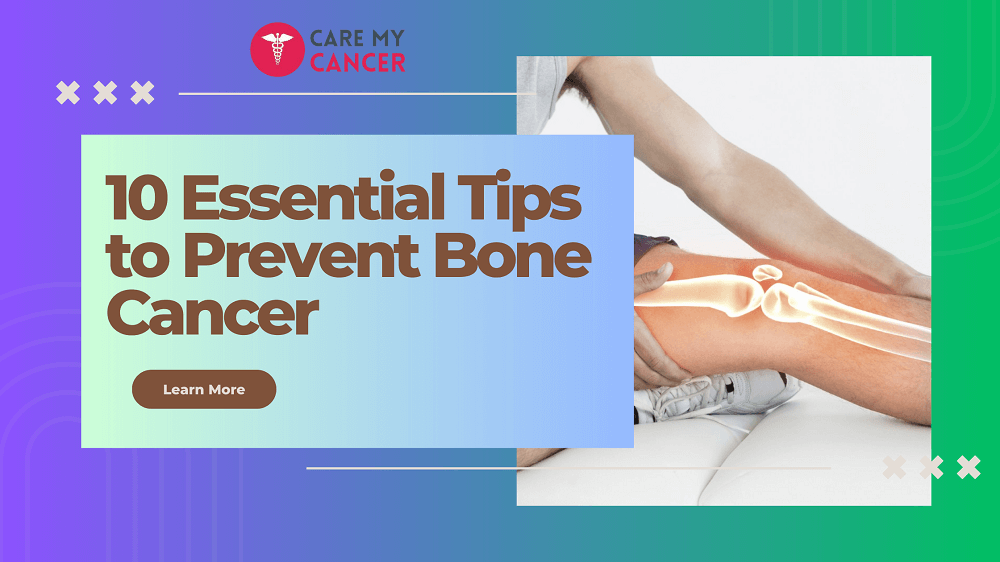Welcome to a guide dedicated to safeguarding your health against the threat of bone cancer. In this comprehensive article, we delve into crucial insights and strategies to prevent bone cancer effectively.
About Bone Cancer
Bone cancer is a rare yet serious condition characterized by the abnormal growth of cells in the bones. It can affect individuals of any age, although it’s more prevalent in children and adolescents. Understanding its nature and risk factors is pivotal in adopting preventive measures.
Risk Factors
Various factors contribute to the development of bone cancer, including genetic predisposition, exposure to radiation, and certain medical conditions like Paget’s disease. Identifying these risk factors empowers individuals to take proactive steps towards prevention.
Importance of Prevention
Prevention plays a pivotal role in reducing the incidence of bone cancer and mitigating its impact on individuals and families. By adopting healthy lifestyle habits and avoiding known risk factors, one can significantly lower their chances of developing this disease.
10 Essential Tips to Prevent Bone Cancer
Bone cancer prevention begins with simple yet effective lifestyle adjustments. Here are ten essential tips to incorporate into your daily routine:
- Maintain a Balanced Diet: Consume a diet rich in fruits, vegetables, whole grains, and lean proteins to support overall health and bolster your immune system against cancerous cell growth.
- Engage in Regular Exercise: Stay physically active with a combination of aerobic exercises, strength training, and flexibility exercises to maintain optimal bone health and reduce cancer risk.
- Attend Regular Health Check-ups: Schedule regular check-ups with your healthcare provider for early detection of any potential health issues, including bone abnormalities or tumors.
- Avoid Tobacco and Limit Alcohol: Steering clear of tobacco products and moderating alcohol consumption can significantly lower the risk of various cancers, including bone cancer.
- Maintain a Healthy Weight: Aim for a healthy body weight through balanced nutrition and regular exercise, as obesity is linked to an increased risk of several types of cancer.
- Protect Your Skin from the Sun: Minimize sun exposure, especially during peak hours, and use sunscreen with a high SPF to reduce the risk of skin cancer, which can metastasize to the bones.
- Consider Genetic Counseling: Individuals with a family history of bone cancer or genetic predisposition may benefit from genetic counseling to assess their risk and explore preventive measures.
- Stay Hydrated: Drink an adequate amount of water daily to support cellular function and promote overall health, which may help prevent various diseases, including cancer.
- Limit Exposure to Radiation: Minimize unnecessary exposure to ionizing radiation from medical imaging procedures and other sources, as prolonged exposure can increase the risk of cancer.
- Seek Emotional Support: Coping with the fear and uncertainty associated with cancer risk can be challenging. Seek support from friends, family, or counseling services to maintain emotional well-being.
Diet and Exercise
A healthy diet and regular exercise regimen are fundamental pillars of cancer prevention. Incorporating nutrient-rich foods and staying physically active not only supports overall health but also reduces the risk of developing bone cancer and other types of cancer.
Regular Health Check-ups
Regular health check-ups are crucial for early detection and intervention in potential health issues. Consult your healthcare provider for routine screenings and examinations to monitor your bone health and overall well-being.
Avoiding Harmful Substances
Tobacco and excessive alcohol consumption are known carcinogens linked to various cancers, including bone cancer. By avoiding these harmful substances, individuals can significantly reduce their cancer risk and promote overall health.
Maintaining a Healthy Weight
Obesity is a significant risk factor for cancer and other chronic diseases. Adopting healthy eating habits and staying physically active can help individuals achieve and maintain a healthy weight, reducing their risk of developing bone cancer.
Sun Protection
Protecting your skin from the harmful effects of UV radiation is crucial for preventing skin cancer, which can spread to the bones. Wear sunscreen, protective clothing, and seek shade to minimize sun exposure, especially during peak hours.
Genetic Counseling
Individuals with a family history of cancer or genetic predisposition may benefit from genetic counseling. These sessions provide valuable insights into inherited cancer risks and empower individuals to make informed decisions about their health.
Importance of Support
Coping with the possibility of cancer can be emotionally challenging. Seek support from loved ones, support groups, or mental health professionals to navigate the emotional journey and maintain overall well-being.
Conclusion
In conclusion, prioritizing preventive measures is paramount in reducing the risk of bone cancer and promoting overall health and well-being. By adopting a balanced lifestyle, attending regular health check-ups, and seeking support when needed, individuals can take proactive steps towards safeguarding their health.
FAQs
What are the early signs of bone cancer?
Early signs of bone cancer may include persistent bone pain, swelling, and unexplained fractures. If you experience any of these symptoms, consult your healthcare provider for further evaluation.
Can bone cancer be inherited?
While most cases of bone cancer are not inherited, certain genetic conditions may increase the risk of developing this disease. Genetic counseling can provide insights into familial cancer risks and preventive measures.
Is bone cancer preventable?
While not all cases of bone cancer are preventable, adopting a healthy lifestyle, avoiding known risk factors, and attending regular health check-ups can significantly reduce the risk of developing this disease.
What role does diet play in preventing bone cancer?
A balanced diet rich in fruits, vegetables, whole grains, and lean proteins provides essential nutrients that support overall health and may help reduce the risk of cancer, including bone cancer.
How often should I undergo cancer screenings?
The frequency of cancer screenings may vary depending on individual risk factors and medical history. Consult your healthcare provider for personalized recommendations on cancer screenings and preventive care.
Are there any specific exercises to prevent bone cancer?
While there are no specific exercises to prevent bone cancer, staying physically active with a combination of aerobic exercises, strength training, and flexibility exercises can support overall health and reduce cancer risk.

